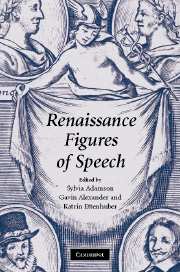Book contents
- Frontmatter
- Dedication
- Contents
- List of illustrations
- List of contributors
- Preface
- Note on spelling and references
- Introduction: the figures in Renaissance theory and practice
- Chapter 1
- Chapter 2
- Chapter 3
- Chapter 4
- Chapter 5
- Chapter 6
- Chapter 7
- Chapter 8
- Chapter 9
- Chapter 10
- Chapter 11
- CHAPTER 11 Hyperbole: exceeding similitude
- Chapter 12
- Chapter 13
- Notes
- Suggestions for further reading
- Index
CHAPTER 11 - Hyperbole: exceeding similitude
Published online by Cambridge University Press: 05 February 2014
- Frontmatter
- Dedication
- Contents
- List of illustrations
- List of contributors
- Preface
- Note on spelling and references
- Introduction: the figures in Renaissance theory and practice
- Chapter 1
- Chapter 2
- Chapter 3
- Chapter 4
- Chapter 5
- Chapter 6
- Chapter 7
- Chapter 8
- Chapter 9
- Chapter 10
- Chapter 11
- CHAPTER 11 Hyperbole: exceeding similitude
- Chapter 12
- Chapter 13
- Notes
- Suggestions for further reading
- Index
Summary
BIRON Taffata phrases, silken terms precise,
Three-pil'd hyperboles, spruce affection,
Figures pedantical — these summer flies
Have blown me full of maggot ostentation.
I do forswear them …
William Shakespeare, Love's Labour's Lost, 5.2.406—10Biron's resolve to abjure the temptations of rhetorical excess is a turning-point in his wooing of Rosaline. It marks the end of an elaborate display of courtship rituals which culminates in Biron's dressing up as a ‘Muscovite’, only to receive a good dressing down at the hands of Rosaline who, throughout the play, evinces an uncanny ability to see through the disguises and ‘vizards’ presented to her. The language of the extract brings rhetorical and theatrical artifice into close, and by no means comfortable, contact with one another: the precious over-refinement of ‘Taffata phrases’ and ‘silken terms’ is a comment on Biron's recent histrionic exploits, but it also reminds the audience of their association with a linguistic habit that may be less easy to shed.
Biron's indictment of stylistic affectation crystallises around one specific figure: hyperbole. In the definition prefaced to this chapter, the sixteenth-century theorist Henry Peacham describes it as ‘a sentence or saying surmounting the truth’ Richard Lanham, in his influential modern update of the rhetoric handbooks, refers to hyperbole as ‘exaggerated or extravagant terms used for emphasis’. The Greek term meant literally ‘a throwing beyond’. Its Latin synonyms, superlatio (literally, ‘the raising to a higher degree’) and superiectio (‘the action of transcending a limit’), help to illustrate hyperbole's trajectory: it covers a broad spectrum of exaggeration and intensification, from the mildly implausible to the downright impossible.
- Type
- Chapter
- Information
- Renaissance Figures of Speech , pp. 197 - 214Publisher: Cambridge University PressPrint publication year: 2007
- 7
- Cited by



